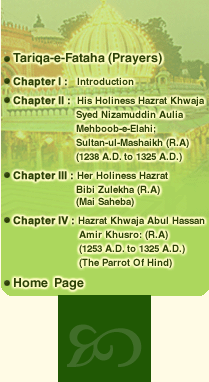|
His Holiness Hazrat Khwaja Syed Nizamuddin
Aulia, Mehboobe-Elahi, Zarizar Baksh, Khwaja-e-Rasteen, Sultanul
Mehboob in, Sultanul Mashaikh (R.A.) was a great Sufi saint
of Chishti Silsila. His Holiness was a radiant picture of
"Simple living and high thinking." His Holiness
was a Supreme messiah. His Holiness illuminated the light
of spiritualism, truth, love, brother-hood, wisdom and divine
knowledge and epitomized peace, happiness and prosperity to
all irrespective of caste, creed or religion. His Holiness
showed keen interest in the promotion of mutual love and goodwill
among all classes of people. When His Holiness found that
the languages and dialectic obstacles clogged the harmony
and hamered the understanding amongst the Afghans, the Iranians,
the Turks, and others, His Holiness ordered his disciple Hazrat
Amir Khusro to invent a ‘new language’, so as to facilitate
inter-communication and homogeneous oneness amongst the
people of India. Very capably, Hazrat Amir
Khusro mixed the Persian with the local ‘Brij Bhasha’
and this mixture laid the foundation for Urdu language. Thus,
His Holiness represents the secular character of our Indian
culture.
His Holiness spiritual powers shook the basis
of seven mighty kingdoms in defending the cause of God. His
Holiness fought the battles of Divine Truth valiantly against
mighty Kings who deviated from the path of righteousness and
justice.
Once Sultan Ghyasuddin Tughlaq called His
Holiness to his Darbar. His Holiness declined. The Sultan
on his way back from Lakhnauti (Bengal) expressed his imaginary
suspicions about His Holiness increasing popularity. The Sultan
in his short-sightedness served the exilement order on His
Holiness by a messenger which read as under:
"By the time we reach Delhi, you should
leave because due to your presence, there is always a great
crowd of the people in the vicinity and accommodation for
the servants of the state is scarce."
His Holiness simply smiled and said "Hanoz
Delhi, dur ast" (i.e. Delhi is very far for your reaching).
Mohammad Tughlaq, son of Sultan Ghyasuddin
had constructed a new wooden palace 6 miles away from Delhi
on the bank of Yamuna (at Afghanpur) for the royal reception
of his father. During the reception the structure surprisingly
collapsed and the Sultan died under its debris.
His Holiness emphasised that jealously and
enmity do not go with the creed of Sufism. Sufism teaches
to treat one’s enemies with all love and forbearance. His
Holiness thus taught the Divine Law of :- what you give that
you shall receive or what you sow abundantly that you shall
reap abundantly! His Holiness says "God gives insights
to His lovers, so that they understand the reality of the
whole Universe." Thus, through faith in HIM, we reach
that faith in us. The faith is ours and we must live it!
Syed Mohammed Hanif Nizami is the thirty-seventh
generation of the Holy Prophet S.A.W. (P.B.U.H.) and present
Sajjada Nashin of Dargah Sharif. He has four sons (the thirty-eight
generation) namely Syed Aziz Nizami (M.A.); Syed Khusro Nizami;
Syed Dr. Salim Nizami and Syed Naeem Nizami.
I, Syed Mohammed Hanif Nizami, Pray to
Almighty Allah Tala (God) that every pilgrim at Dargah
Sharif and reader of this book, irrespective of caste,
creed, race and religion be blessed with peace, happiness,
abundance, prosperity and spirituality and Almighty Allah
Tala (God) shower his choicest blessings and mercy to
all!
May Allah Tala (God) continue to illuminate
the lamp of Chishti Silsila till the last day of the Universe!
Amin!
New Delhi
6th December, 2002
|





